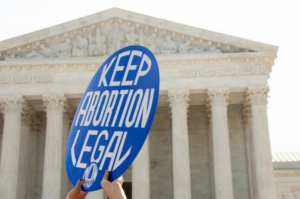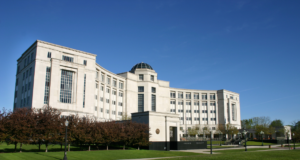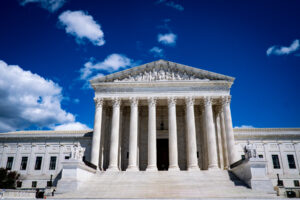Ducey weighs in on Supreme Court challenge to pre-viability abortion
3 min read
Gov. Doug Ducey joined 11 other governors in filing an amicus brief in Dobbs v. Jackson Women’s Health Organization in which the Supreme Court will rule on “whether all pre-viability prohibitions on elective abortions are unconstitutional.”
In March of 2018, Mississippi passed the “Gestational Age Act” into law, prohibiting abortions after 15 weeks of pregnancy except in cases of medical emergencies or fetal abnormalities. Jackson Women’s Health Organization, Mississippi’s only licensed abortion facility, challenged the law’s constitutionality in U.S. district court and requested an emergency temporary restraining order to block the enforcement of the law. The district court granted their request, holding that the law was unconstitutional because “viability marks the earliest point at which the State’s interest in fetal life is constitutionally adequate to justify a legislative ban on nontherapeutic abortions.”
Mississippi Department of Health state health officer Thomas Dobbs appealed to the U.S. Court of Appeals for the 5th Circuit for review. Dobbs appealed to the Supreme Court after the circuit court affirmed the district court’s ruling.
On May 17, 2021, the Supreme Court agreed to hear the case. This marks the first time that the Court will rule on the constitutionality of a pre-viability abortion ban since Roe v. Wade in 1973. If the Court rules in favor of Dobbs, states will be allowed to restrict abortion pre-viability, overturning the decisions in Roe v. Wade and Planned Parenthood v. Casey.
The amicus brief filed by the coalition of Republican governors said that Dobbs gave the Court the opportunity to “correct the mistakes in its abortion jurisprudence and recognize that the text and original understanding of the Fourteenth Amendment have nothing to do with abortion.”
They wrote that the Court should allow states, rather than the federal government, to regulate abortion.
“This Court should hold as much—and in the process, help restore the constitutional (but currently disrupted) balance between the Federal Government and the States,” the governors wrote.
In a statement about the amicus brief, Ducey defended his commitment to “protecting families and preborn children.”
“Every single life has immeasurable value. That includes children who are preborn — and I believe it’s each state’s responsibility to protect them,” the governor stated. “It is time for the U.S. Supreme Court to fix their mistake and return this authority to the individual states as the democratic process intends.”
Nancy Northup, president and CEO of the Center for Reproductive Rights, said in a statement that the Court’s agreement to hear the case raised concerns regarding the stability of “reproductive rights.”
“The Supreme Court just agreed to review an abortion ban that unquestionably violates nearly 50 years of Supreme Court precedent and is a test case to overturn Roe v. Wade,” she said.
Carol Tobias, president of National Right to Life, said that Roe v. Wade must be reevaluated as scientific knowledge has advanced since the 1973 ruling.
“The medical advances made in our knowledge of unborn children and their care and treatment are astonishing,” Tobias said in a statement. “Today, the viability of an unborn child is dependent on how advanced our technology has become.”
Arizona Attorney General Mark Brnovich additionally filed an amicus brief alongside 23 other attorneys general requesting the reversal of the court of appeals’ judgment.
The amicus brief argued that the Court’s abortion precedent is “erroneous, inconsistent, uneven, and unreliable.” They said that precedent does not warrant stare decisis(a decision to stand on previous rulings) because Roe and Casey “created and preserved a nonexistent constitutional right” and because the Court has changed the constitutional test in multiple cases. The attorneys general concluded that “Roe and Casey should be overruled.”
The case is pending in the U.S. Supreme Court.
This article was originally posted on Ducey weighs in on Supreme Court challenge to pre-viability abortion







